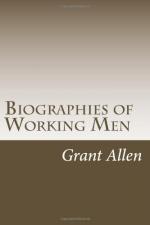I.
Thomas Telford, stonemason.
High up among the heather-clad hills which form the broad dividing barrier between England and Scotland, the little river Esk brawls and bickers over its stony bed through a wild land of barren braesides and brown peat mosses, forming altogether some of the gloomiest and most forbidding scenery in the whole expanse of northern Britain. Almost the entire bulk of the counties of Dumfries, Kirkcudbright, and Ayr is composed of just such solemn desolate upland wolds, with only a few stray farms or solitary cottages sprinkled at wide distances over their bare bleak surface, and with scarcely any sign of life in any part save the little villages which cluster here and there at long intervals around some stern and simple Scottish church. Yet the hardy people who inhabit this wild and chilly moorland country may well be considered to rank among the best raw material of society in the whole of Britain; for from the peasant homes of these southern Scotch Highlands have come forth, among a host of scarcely less distinguished natives, three men, at least, who deserve to take their place in the very front line of British thinkers or workers—Thomas Telford, Robert Burns, and Thomas Carlyle. By origin, all three alike belonged in the very strictest sense to the working classes; and the story of each is full of lessons or of warnings for every one of us: but that of Telford is perhaps the most encouraging and the most remarkable of all, as showing how much may be accomplished by energy and perseverance, even under the most absolutely adverse and difficult circumstances.
Near the upper end of Eskdale, in the tiny village of Westerkirk, a young shepherd’s wife gave birth to a son on the 9th of August, 1757. Her husband, John Telford, was employed in tending sheep on a neighbouring farm, and he and his Janet occupied a small cottage close by, with mud walls and rudely thatched roof, such as in southern England even the humblest agricultural labourer would scarcely consent willingly to inhabit. Before the child was three months old, his father died; and Janet Telford was left alone in the world with her unweaned baby. But in remote country districts, neighbours are often more neighbourly than in great towns; and a poor widow can manage to eke out a livelihood for herself with an occasional lift from the helping hands of friendly fellow-villagers. Janet Telford had nothing to live upon save her own ten fingers; but they were handy enough, after the sturdy Scotch fashion, and they earned some sort of livelihood in a humble way for herself and her fatherless boy. The farmers about found her work on their farms at haymaking or milking, and their wives took the child home with them while its mother was busy labouring in the harvest fields. Amid such small beginnings did the greatest of English engineers before the railway era receive his first hard lessons in the art of life.




